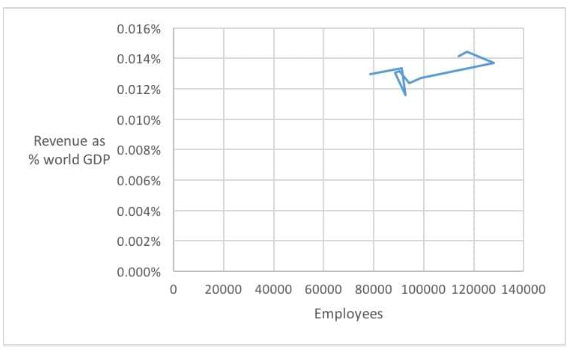OCTOBER 8, 2016 · FACEBOOK
Used to be the limits to company growth were access to the global market. That is no longer the barrier. Everybody has (potential) access to all customers day one. What’s the new rate-limiting factor? If the rules have changed, what have they changed to? One possibility is that the rate at which a company can accumulate employees is the rate-limiting factor to growth.
Warning: rank speculation. This note is the combination of three ideas.
1. Zuck’s VR demo. Being together without being together is clearly within reach in the next five years.
2. Numerous conversations about the limits to growth in Menlo Park, the difficulty growing remote offices, and the role of employee growth in company growth.
3. A conversation with Ian Saville about growth. We were speculating about just how fast a company could grow to Facebook’s market cap. It’s hard to imagine getting there faster than Facebook did, but Facebook did it faster than Google and Google did it faster than Microsoft. As a betting man, I’m betting on the next someone doing it faster than Facebook did. How?
Smoosh the above ideas together and here’s what I get: the next mega- company will use VR to accumulate employees faster than anyone in history (including Facebook, unless Facebook does it first). [ed: lol]
Now, some data. Microsoft has settled in with their revenue at 0.012- 0.014% of global GDP (I just made up this statistic, my gut tells me it’s useful, but I can’t defend it). As they add employees, the percentage goes up a little but it’s all starting to look a bit Brownian.
Add Google to the picture and you see a younger company, still growing vigorously in both revenue and employees. (This is nine years of data, one less than for Microsoft.)
I only found four years of data for Facebook’s employee count and revenue. Facebook is on a seemingly-steeper trajectory than Google. Where Facebook tops out is still unclear from this data.
I can poke all kinds of holes in my thesis:
Revenue per employee seems to be the stronger trend, e.g. Instagram and then holy cow WhatsApp. Granted we can only measure market cap per employee (a proxy for future revenue/profit). It might make sense to make the slope steeper rather than try to enable growth along the horizontal axis and expect that to stimulate growth vertically.
What about the large Chinese software companies? Have they accumulated employees faster than we have, or Google? What has that done for their growth?
Not enough, nor clean enough data. Not enough years. Not enough companies.
My gut is telling me there is a strategy out there, one contrarian to how Facebook grew. Facebook had n “Menlo Park-only for as long as possible” strategy in engineering (I know, as one of the few remote employees). If I stumbled on the Next Big Thing, I’d be tempted to spend a fortune on VR to try to accumulate employees faster (along with training, enculturation, maybe a scaled up Rotational Engineering program).




I don't understand the third diagram --- meta has 75k-ish employees, down from 85k-ish, don't they?
according to site:investor.fb.com headcount
and then in 2024 AI changes the game faster than VR...